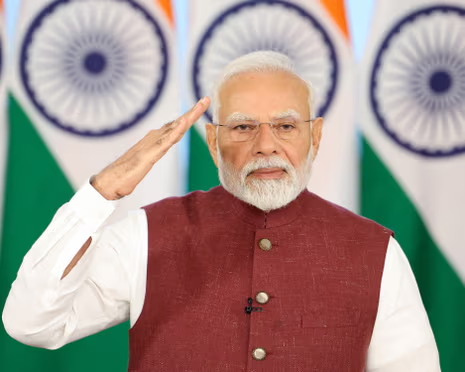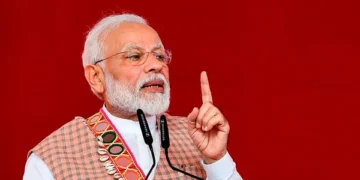Indian PM Modi states that military operations have only been paused, not ended, following the ceasefire agreement with Pakistan, emphasizing continued vigilance.

Prime Minister Narendra Modi stated on Monday that India has only “paused” its military response following the recent U.S.-mediated ceasefire. In his first public remarks since the agreement, Modi emphasized that any future terrorist attack on Indian soil will be met with retaliation “on India’s own terms,” signaling a firm stance on national security despite the temporary halt in hostilities.
Indian Prime Minister Narendra Modi spoke following confirmation from both Indian and Pakistani officials that there had been no exchange of gunfire overnight along the heavily fortified border region—marking the first peaceful night after several consecutive days of cross-border firing.
Tensions between the nuclear-armed neighbors intensified following a deadly attack on tourists in Kashmir, raising serious concerns about regional stability. India blamed Pakistan for supporting the militants responsible for the assault—an accusation that Islamabad firmly rejected.
Prime Minister Narendra Modi, in a national address, stated that India would closely observe every action taken by Pakistan. Responding to international appeals for dialogue, he emphasized that any potential talks with Pakistan would focus solely on terrorism and the issue of Pakistan-occupied Kashmir. Both India and Pakistan currently administer different parts of Kashmir, but each claims the region in its entirety.
He did not respond to U.S. President Donald Trump’s offer to mediate. Meanwhile, India and Pakistan agreed on Saturday to cease all military operations across land, air, and sea.
Pakistani Prime Minister Shehbaz Sharif stated that Pakistan agreed to the ceasefire in a spirit of peace, emphasizing that while the country supports efforts to maintain stability, it will never allow any breach of its sovereignty or territorial integrity. His remarks came during a meeting with the Turkish ambassador, according to an official government release.
Senior military officials from India and Pakistan held a hotline conversation on Monday to review the status of the ongoing ceasefire along their shared borders. During the discussion, both sides reaffirmed their commitment to maintaining peace, including an agreement to avoid any exchange of fire or provocative actions. The Indian Army stated that both nations also explored the possibility of reducing troop deployments in forward and border areas as a confidence-building measure to support long-term stability.
The Indian Army reported that the night passed without incident, with calm prevailing across Jammu and Kashmir as well as other regions along the international border.
Local authorities in Pakistan-administered Kashmir reported a complete halt in cross-border firing along the Line of Control (LoC), the unofficial boundary dividing the disputed Kashmir region between India and Pakistan. Officials also confirmed that civilians who had been displaced due to recent hostilities have begun returning to their homes, as the situation on the ground remains calm.
Lt. Gen. Ahmad Sharif, spokesperson for Pakistan’s military, affirmed late Sunday that Pakistan remains dedicated to honoring the ceasefire agreement and will not be the first to breach it.
Following the announcement, Pakistan swiftly reopened its airports and resumed full flight operations. On Monday, India followed suit, reopening all 32 airports that had been temporarily closed across its northern and western regions.
Tensions between the two nations’ armed forces escalated into one of their most serious standoffs in decades following an Indian airstrike on Wednesday. India claimed it targeted locations inside Pakistan linked to the militants responsible for last month’s brutal killing of 26 tourists in Indian-administered Kashmir. The victims, primarily Indian Hindu men, were murdered in front of their families, an act that sparked national outrage and demands for retaliation.
Wednesday’s attacks in Pakistan, intense exchanges of fire erupted across Kashmir, with both sides launching missile and drone strikes into each other’s territories. These attacks primarily targeted military facilities and airbases. Both nations reported significant civilian casualties, with dozens killed on each side.
Table of Contents
The Indian military stated on Sunday that, for the first time, their operations in Pakistan-controlled Kashmir and Pakistan last week resulted in the deaths of over 100 militants, including several key leaders.
Lt. Gen. Rajiv Ghai, who heads India’s military operations, announced that Indian forces successfully targeted and destroyed nine militant infrastructure and training centers. Among these were sites linked to the Lashkar-e-Taiba group, which India holds responsible for several major attacks within the country.
Ghai reported that at least 35 to 40 Pakistani soldiers were killed in the clashes along the Line of Control, while five Indian soldiers also lost their lives.
Pakistan’s Information Minister, Attaullah Tarar, announced on Thursday that the country’s military had reportedly killed between 40 to 50 Indian soldiers along the Line of Control. The Pakistani military also claimed to have shot down five Indian fighter jets and caused significant damage to Indian military assets by targeting 26 key locations within India.
India’s Air Chief Marshal AK Bharti, who serves as the Director General of India’s air operations, addressed the media on Monday. He reported that while there had been some “minor damages,” all military bases and air defense systems remain fully functional and operational. He assured that these assets are prepared for any further missions if necessary. However, the claims made by both India and Pakistan have not been independently verified by The Associated Press.
READ ALSO…..Ceasefire Initiated by US President: Rahul Gandhi Appeals to PM for Special Parliament Session















 Categories
Categories









